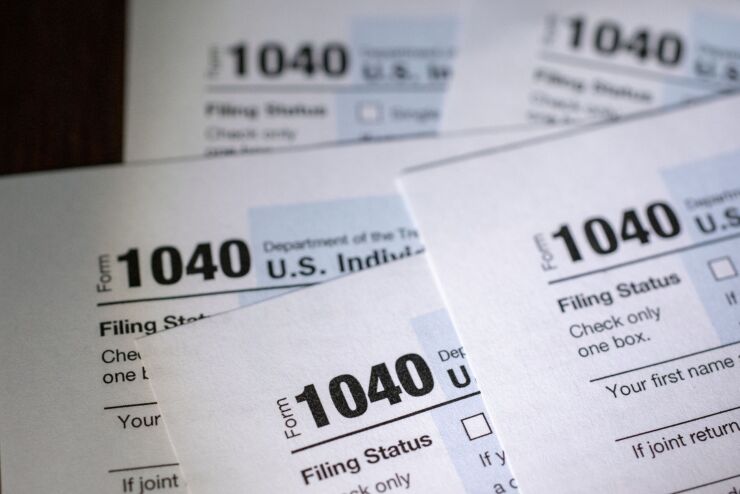Actively managed mutual funds have bravely battled the indexing revolution sweeping the financial industry, but President Biden’s proposed capital gains tax increase may be the coup de grace.
Bloomberg News reported on Thursday that the White House wants to raise the federal capital gains tax rate to 43.4% for wealthy individuals, which would be the highest rate ever in the U.S. For those in high-tax states such as New York and California, the combined state and federal rate would be well above 50%.

The news set off a flurry of debates about the potential impact on the economy, wealth inequality, markets, investment and jobs. But the one group that almost certainly stands to lose if the capital gains tax rate moves meaningfully higher is actively managed mutual funds.
Investors have known for years that actively managed mutual funds have little to offer. Numerous studies have shown that the vast majority of them fail to beat their benchmarks, often because their fees are too high. A growing number of investors are giving up on active management altogether, handing their money to index funds that track broad markets. For adherents of active management, there are index funds that replicate virtually any active strategy. Whether it’s value, growth, quality, momentum, small companies, thematic investing, long-short equity or merger arbitrage, there’s an index fund that does it cheaply and reliably, and usually more than one.
-
Over half of individuals making at least $100,000 a year will save a chunk of their tax refund this year.
April 1 -
The Internal Revenue Service responded Tuesday to calls for extending more tax deadlines by giving taxpayers until May 17 to make IRA and HSA contributions and file some refund claims.
March 30 -
Concerned that tax rates and IRS bills may rise under Biden, wary advisors note that Roth plans are not just for younger investors.
April 6
And yet there’s still considerably more money in actively managed mutual funds. There are roughly 24,000 actively managed mutual funds in the U.S., including their various share classes, managing close to $17 trillion and charging an asset-weighted average expense ratio of 0.62% a year, according to Morningstar data. By comparison, there are about 3,000 index mutual funds and ETFs managing $11 trillion and charging 0.14% a year.
So why is there still so much more money in actively managed mutual funds? The answer is capital gains. People hate paying taxes, of course. And if they don’t sell, there is no immediate capital gains hit, even if it means tolerating gratuitously expensive and underperforming funds. But if Biden jacks up the capital gains tax rate, many of them will dump their funds to avoid paying a higher tax down the road.
That money is likely to land in ETFs because they offer a crucial tax advantage. Unlike mutual funds, ETFs generally don’t distribute capital gains. When investors redeem their mutual fund shares, the fund must sell some of its investments to raise the necessary cash, which generates capital gains for remaining shareholders. With ETFs, investors buy and sell shares from other investors, so the funds don’t have to sell their holdings to satisfy redemptions. In a world where capital gains are taxed at upward of 50%, dodging capital gains distributions can add up to big savings. (Although investors may still be subject to capital gains taxes when they sell their ETF shares.)
The migration from actively managed mutual funds to cheaper and more tax efficient ETFs may sound disruptive, but the impact on markets is likely to be minimal. Investors will be moving money between similar investments rather than pulling it out of the market, so asset prices shouldn’t move much.
That doesn’t mean there won’t be a fuss. It has become fashionable to speculate that index investing is hurting the economy and markets, some even calling it “worse than Marxism.” That chatter will intensify as index funds gain market share. A lot of the money is also likely to find its way to BlackRock’s iShares and Vanguard, the two biggest money managers on the planet who have all but cornered the ETF market. Some observers accuse them of wielding monopolistic powers and excessive influence over financial markets. Those calls are likely to intensify, too.
Over the past year, the 20 mutual funds in this ranking have an average gain of more than 100%. Their fees are also more than twice the broader industry.
For now, it’s unclear how much Biden can realistically raise the capital gains tax rate, if at all. It also remains to be seen when an increase would take effect. If the new rate is applied retroactively to 2021, investors won’t be able to do much about it. Keep in mind, too, that none of this affects retirement accounts for investors who haven’t yet reached retirement age.
Aided by booming markets, active managers have withstood the surge of index investing so far. But an even more potent disruptor may be looming.






